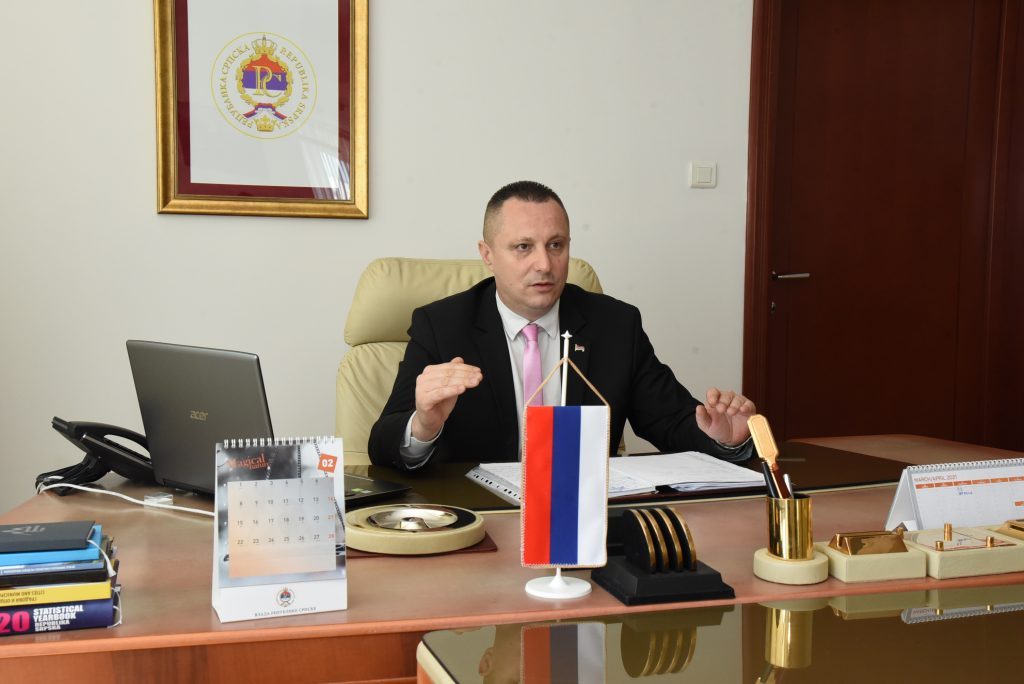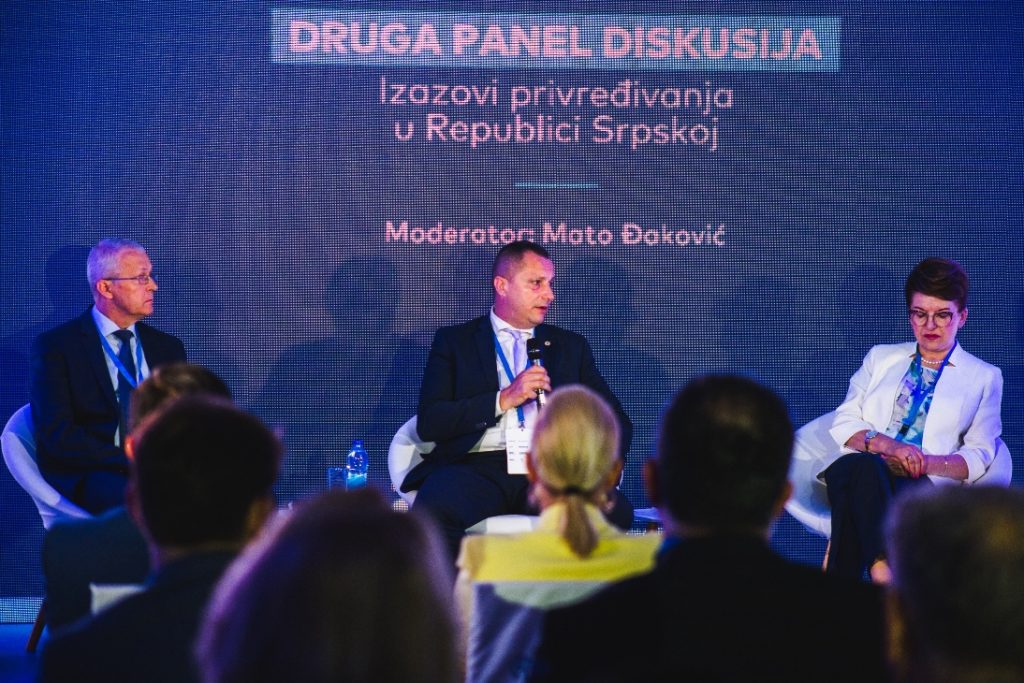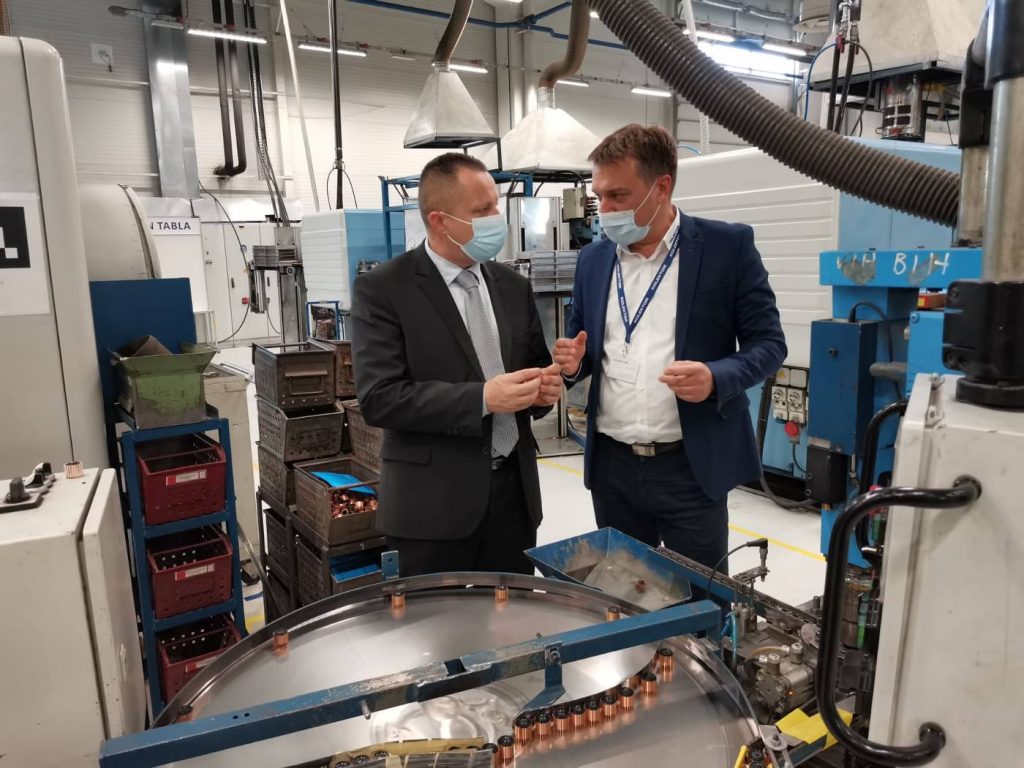Estimates say that this year we will have GDP growth of up to 4.5%, and in terms of jobs, today, there are more workers in the Republic of Srpska than in the period before the pandemic.

“Despite the global health crisis, the Republic of Srpska’s economy has successfully coped with the challenges created by the pandemic, which is validated by the latest macroeconomic indicators. There are many positive examples of investments on both sides of the Drina River, but there is always room and interest for establishing even stronger cooperation with Serbia. In the future, we will work on establishing more business connections, better product promotion, and exchange of know-how and experiences.”
What is the current economic environment in the Republic of Srpska like? How much does the state allocate for economic development and what kind of investments are made?
Statistically speaking, the Republic of Srpska’s GDP in the first quarter of 2021, compared to the same period in 2020, recorded a 2.3% growth, while last year, we recorded a GDP decline of 2.5%, which is the lowest decline in the region after Serbia. Our estimates show that this year we will have a GDP growth of up to 4.5%, and certain analyses predict that the Republic of Srpska’s GDP per capita will soon surpass the one in the other entity of Bosnia and Herzegovina for the first time.
The average salary has been constantly growing and has exceeded 500 euros, which we consider a great success because it was achieved in a period that was not stimulating for the economy. I would also like to mention that Srpska already exceeded the average salary paid out in the Federation of Bosnia and Herzegovina last year, which was, among other things, the result of the incentives aimed at increasing salaries, implemented by our ministry.
We also have a record-breaking export to import ratio which currently stands at 80%, while exports in the first half of 2021 amounted to 2 billion KM, which is an almost 30% increase compared to the same period last year but also compared to 2019.
The increase in industrial production in the period January-June 2021 was 25% relative to the same period last year, with the processing industry has recorded a 17% growth, which is extremely important because it accounts for 85% of Srpska’s exports and employs more than 58,000 workers.
The most important thing to perhaps highlight is the fact that jobs in Republika Srpska have not been lost, but on the contrary, we have more workers today than in the period before the outbreak of the pandemic.
Our Ministry is the driving force behind the new Free Zone Law in the Republic of Srpska, which is more detailed than the previous one and in line with the latest trends
Which economic branches would you single out as the driving force behind the Republic of Srpska’s economic development and which have a lot of investment potential?
The metal processing, electrical, wood processing, textile, leather and footwear industries stand out as the most prominent economic branches here, as well as the branches with the biggest share in the export of the Republic of Srpska. The IT sector, renewable energy and tourism have the biggest potential.
Immediately before the coronavirus outbreak, the Ministry of Economy and Entrepreneurship launched the Srpska – Republic of Opportunities campaign, with which we presented investment opportunities. As the main reasons for investing we highlighted the favourable geostrategic position, transport connections, competitive workforce and low operating costs, given that the income tax is 10%, and the dividend tax is zero, i.e. it does not exist.
The promotion of our economic potentials will be of great importance in the coming period, considering that the opportunity has been created for part of the Western European industry, which has had its plants in China so far, to transfer its production to the European continent, more precisely to the Western Balkans. Global economic trends at the time of the pandemic, including the situation with supply chains, have demonstrated how complicated things get when there is a disruption with transport, increase in prices of raw materials and shortages of certain goods and products.

How did the COVID-induced crisis affect the economy and entrepreneurship of the Republic of Srpska? What measures have been implemented to mitigate the effects of the crisis?
After the global pandemic was declared in March 2020, the Government of the Republic of Srpska implemented a series of measures aimed at supporting the economy. As the line ministry, we have been continuously working on mitigating the harmful consequences and we did so through various measures; firstly, through support for companies that had to shut down or operated on a reduced scale, to which we directly allocated over 70 million KM through the Compensation Fund and paid salaries to workers.
Then, we set up the Guarantee Programme, which had a budget of 238 million KM available to businesses whereby favourable loans were granted to companies that were damaged by the pandemic. The Republic of Srpska provided guarantees in the amount of up to 70 percent.
To maintain the economy’s liquidity, the Banking Agency of the Republic of Srpska and the Investment and Development Bank of the Republic of Srpska have implemented a moratorium on payment of due loans and grace period for both businesses and individuals. The Tax Administration also allowed deferred payment of due taxes for all companies and small businesses, while together with the Ministry of Finance and with the help of legal solutions, we reduced fiscal and parafiscal levies, in order to alleviate the financial burden on companies.
Tax revenues grew this year too, while positive economic indicators tell us that the measures implemented by the Republic of Srpska’s Government were effective. Today, we can say that we have managed to preserve the vitality of our economy, jobs and economic activity.
What projects are you currently working on and what else do you plan to do to improve the Republic of Srpska’s economy?
For the economy to continue to develop, we need to invest in research, digitalization, and create our own product lines, especially for those who do LOHN deals in the wood industry and textiles, leather and footwear. In the long run, economic development must not be based on having the cheapest workforce, but on significantly improving it technologically in order to be competitive in a demanding foreign market.
Among other things, the Ministry of Economy and Entrepreneurship supports companies when they make direct investments in the processing industry through the procurement of modern technologies and equipment, as well as development and innovation. Since the formation of this ministry, we have been known for salary-boosting incentives in the business sector, which benefitted 13 million KM because of these salaries so far.
There are also other activities I would like to single out like drafting the Law on Social Entrepreneurship. Once the law is adopted by the year-end, we will become one of the first countries in the region to have such a law.

You said that the free zone in the Republic of Srpska could be formed by the end of this year. What exactly does it mean and in what way will it contribute to economic development?
Our Ministry is the driving force behind the new Free Zone Law in the Republic of Srpska, which is more detailed than the previous one and in line with the latest trends. By working together with the rest of Bosnia and Herzegovina, our goal is to form the first free zones by the end of the year. Cities such as Gradiška, Trebinje, Bijeljina, Doboj and other municipalities that have good transport connections, infrastructure, available workforce and interested companies have great potential.
The Republic of Serbia is a good example not only when it comes to attracting investors, but also the formation of a free zone. When we were drafting the aforementioned law, we had constant meetings with the management of the Pirot free zone who shared their experiences with us. Also, the study covering the formation of a duty-free business zone in Bratunac is going to be completed soon, where, following the conclusions from the joint session of the Governments of Srpska and Serbia, we will invest 10.5 million euros in infrastructure, which will kickstart the Podrinje investment project.
Serbia is our most important economic partner, and the two republics nurture a relationship that goes beyond mere trade
What is the economic cooperation between the Republic of Srpska and the Republic of Serbia like?
Serbia is our most important economic partner, and the two republics nurture a relationship that goes beyond mere trade. Our economic cooperation is strong, our officials meet frequently and our business people have direct contacts. I would also like to underline the cooperation of our ministry with the Ministry of Economy and the Ministry of Defence of the Republic of Serbia.
I am, first and foremost, referring to cooperation in the segment of the arms industry and the recently signed 3.7-million-euro-contract whereby the Orao Company from Bijeljina will overhaul aircraft engines for the needs of the Serbian Army. This is just one in a series of examples of a successful partnership between the military industry of Srpska and Serbia.
Recently, at the invitation of the President of Serbia, Aleksandar Vučić, I attended the opening of the Jumko paint shop in Rudna Glava. I would like to remind you that this renowned textile company has opened a production plant in Drvar, which Serbia has been supporting in order to boost the town’s economic development and the living standard. After that, I came to Vranje, where I met with the director of Jumko to discuss the possibility of opening a new plant in Herzegovina, given that Herzegovina has the experience and tradition of the textile industry and a trained workforce.
Our commitment is to export more domestic products to the regional market, and especially Serbia, considering that we still import significantly more than we export to Serbia, and we certainly have something to offer. This was evident at the recent meeting with a delegation of businesspeople from Stara Pazova, at which we discussed the possibilities for product placement, especially in the processing and food industry.